
The Directory was the governing five-member committee in the French First Republic from 26 October 1795 until November 1799, when it was overthrown by Napoleon Bonaparte in the Coup of 18 Brumaire and replaced by the Consulate. In mainstream historiography, the term Directoire is also used to refer to the period, coinciding with the final four years of the French Revolution.
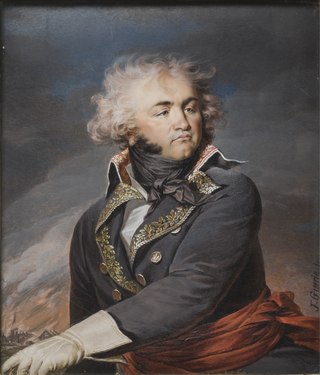
Jean-Baptiste Kléber was a French military officer who served in the War of the Bavarian Succession and the French Revolutionary Wars. After serving for one year in the French Royal Army, he joined the army of the Holy Roman Empire seven years later. However, his humble birth hindered his opportunities. Eventually, Kléber's joined the French Revolutionary Army in 1792 and quickly rose through the ranks.
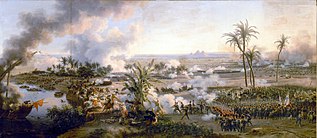
The Battle of the Pyramids, also known as the Battle of Embabeh, was a major engagement fought on 21 July 1798, during the French Invasion of Egypt. The battle took place near the village of Embabeh, across the Nile River from Cairo, but was named by Napoleon after the Great Pyramid of Giza visible nearly nine miles away.
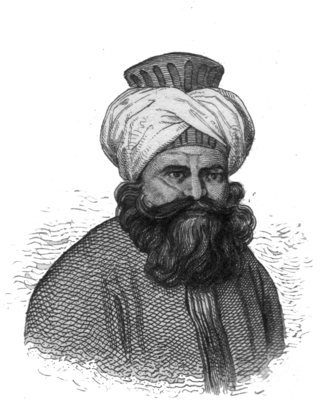
Murad Bey Mohammed was an Egyptian Mamluk chieftain (Bey), cavalry commander and joint ruler of Egypt with Ibrahim Bey. He is often remembered as being a cruel and extortionate ruler, but an energetic courageous fighter.

In the Battle of Abukir Napoleon Bonaparte defeated Seid Mustafa Pasha's Ottoman army on 25 July 1799, during the French campaign in Egypt. It is considered the first pitched battle with this name, as there already had been a naval battle on 1 August 1798, the Battle of the Nile. No sooner had the French forces returned from a campaign to Syria, than the Ottoman forces were transported to Egypt by Sidney Smith's British fleet to put an end to French rule in Egypt.

Ottoman Egypt was an administrative division of the Ottoman Empire after the conquest of Mamluk Egypt by the Ottomans in 1517. The Ottomans administered Egypt as a province (eyalet) of their empire. It remained formally an Ottoman province until 1914, though in practice it became increasingly autonomous during the 19th century and was under de facto British control from 1882.

Abd al-Rahman ibn Hasan al-Jabarti was an Egyptian-Somali Islamic scholar and historian who spent most of his life in Cairo.

The Plot of the rue Saint-Nicaise, also known as the Machine infernale plot, was an assassination attempt on the First Consul of France, Napoleon Bonaparte, in Paris on 24 December 1800. It followed the conspiration des poignards of 10 October 1800 and was one of many Royalist and Catholic plots. Though Napoleon and his wife Joséphine narrowly escaped the attempt, five people were killed and twenty-six others were injured.

Jacques-François de Menou, Baron of Boussay, later Abdallah de Menou, was a French statesman and general of Napoleon during the French Revolutionary Wars, most noted for his role in the Egyptian Campaign conducted between 1798 and 1801.

The French invasion of Egypt and Syria was a military campaign in and occupation of Ottoman territories in Egypt and Syria by French forces under the command of Napoleon took place during the French Revolutionary Wars. It was the primary purpose of the Mediterranean campaign of 1798, in which the French captured Malta while being followed by the British Royal Navy, whose pursuit was hampered by a lack of scouting frigates and reliable information.

The Battle of Mount Tabor was fought on 16 April 1799, between French forces commanded by Napoleon Bonaparte and General Jean-Baptiste Kléber, against an Ottoman Army under Abdullah Pasha al-Azm, ruler of Damascus. The battle was a consequence of the siege of Acre, in the later stages of the French Campaign in Egypt and Syria.

The siege of Alexandria was fought during the French Revolutionary Wars between French and British forces. It was the last action of the French campaign in Egypt and Syria (1798–1801). The French had occupied Alexandria, a major fortified harbour city on the Nile Delta in northern Egypt, since 2 July 1798, and the garrison there surrendered on 2 September 1801.
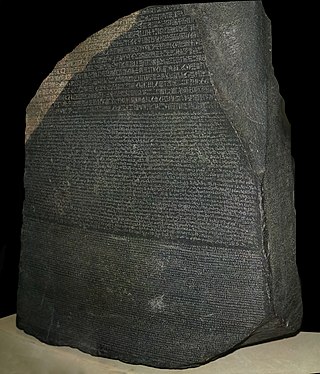
The Capitulation of Alexandria in August 1801 brought to an end the French expedition to Egypt.

Thomas Prosper Jullien was a French army officer of the French Revolutionary Wars. Aide de camp to Bonaparte, he rose to the rank of captain and was brother of the famous general Louis Joseph Victor Jullien de Bidon.
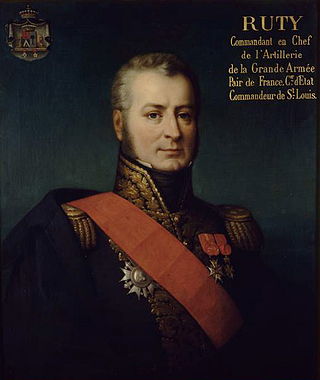
Charles-Étienne-François de Ruty, count, was a French artillery officer during the French Revolutionary Wars and Napoleonic Wars, who rose to the rank of general of division, state counsellor (1818) and Peer of France from 1819.

Nicolas-Marie Songis des Courbons, Count of the Empire,, was a French artillery commander during the French Revolutionary Wars, who rose to the rank of General of Division in 1800 and served as commander of the Grande Armée artillery between 1805 and 1809, during the Napoleonic Wars.

The Revolt of Cairo was a revolt that occurred on 21–22 October 1798 by the citizens of Cairo against the French occupation of Egypt led by Napoleon Bonaparte.

Trabluslu Ali Pasha, also known as Cezayirli Ali Pasha or Seydi Ali Pasha, or Ali Burghol (Burghul) was an Ottoman statesman. He served as the Ottoman governor of Egypt from July 1803 to February 1804.
Tahir Pasha Pojani or Tahir Pasha born in Kavala as the son of Ahmed Bey from Pojan and Zohra Khanum, oldest sister to Muhammad Ali Pasha. His Siblings was Ismail, Huseyin and Gülsün who was married with Mehmet Sabit Pasha. His son was Ahmed Tahir Pasha Pojani b. in Kavala, who was married with Hatice Khanum b.in Alexandria a daughter of Nawab Mirza Shahmir Khan Bahadur of Oudh. He was the Albanian commander of bashi-bazouks under Koca Hüsrev Mehmed Pasha. He rebelled and assumed government of Cairo, becoming the acting Ottoman governor of Egypt on 6 May 1803. He was beheaded by a Janissary soldier within a month of acting as governor when he was unable to pay the troops their outstanding pay.
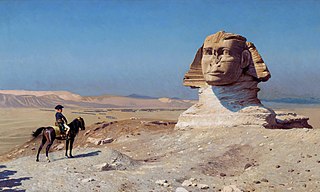
The Convention of El Arish was signed on 24 January 1800 by representatives from France and the Ottoman Empire in the presence of a British representative. It was intended to bring to an end the French campaign in Egypt and Syria, with the repatriation of French troops to France and the return of all territory to the Ottomans.




















